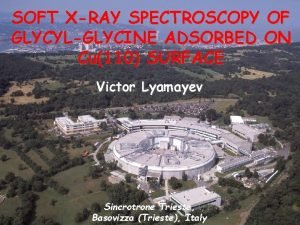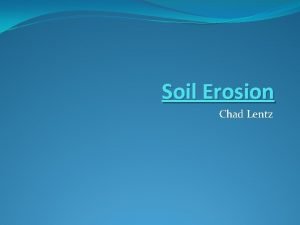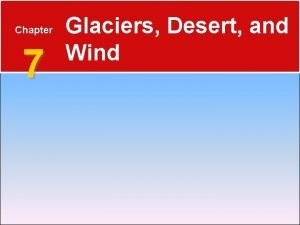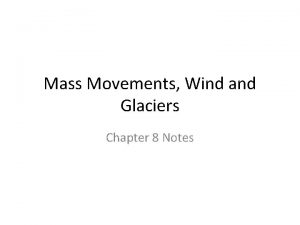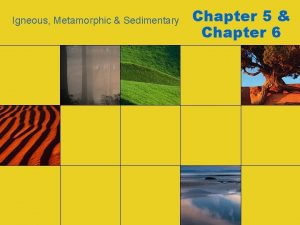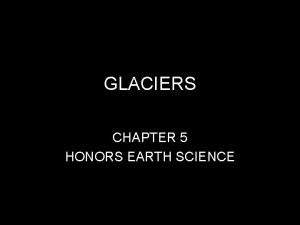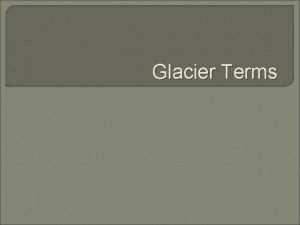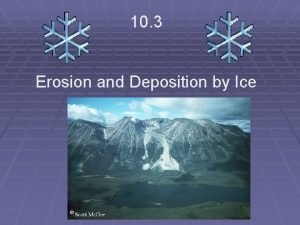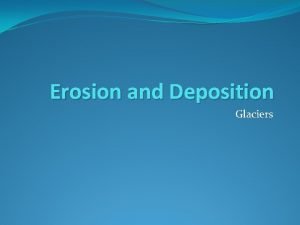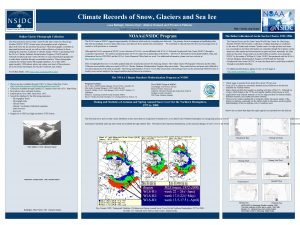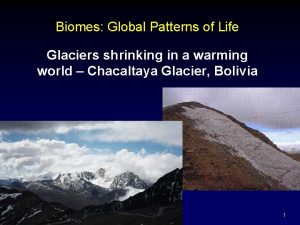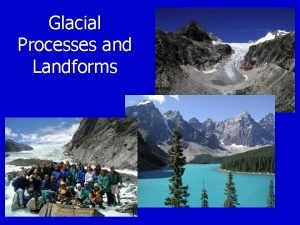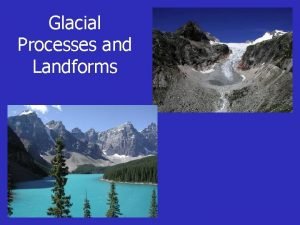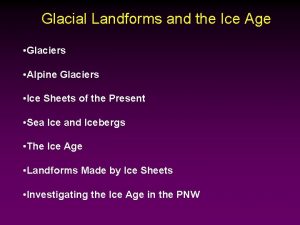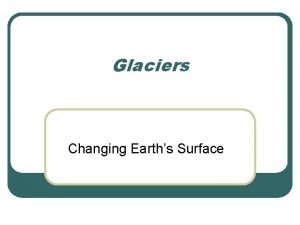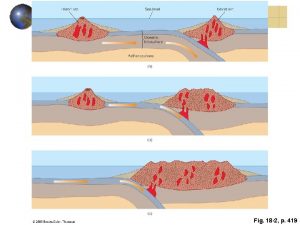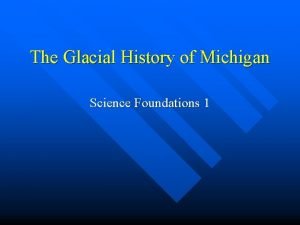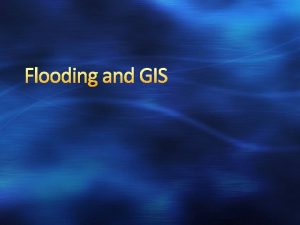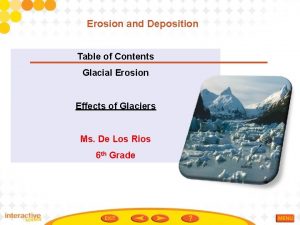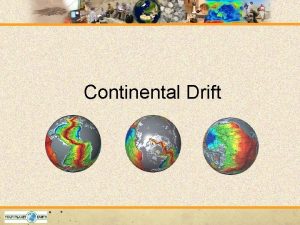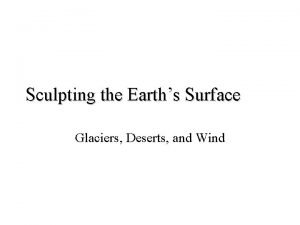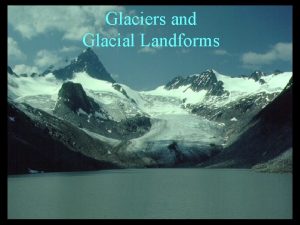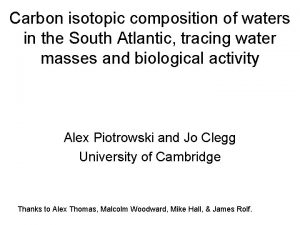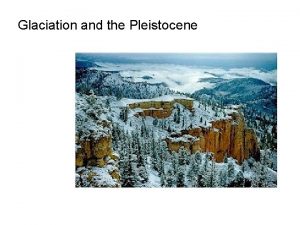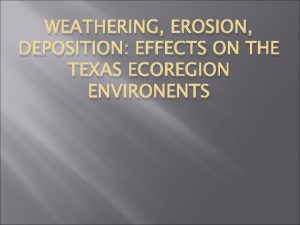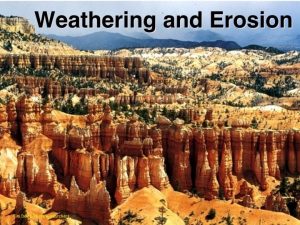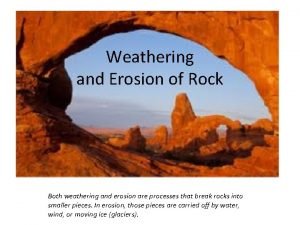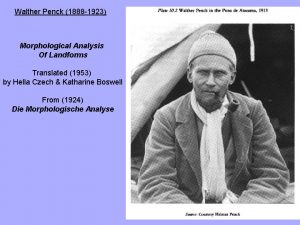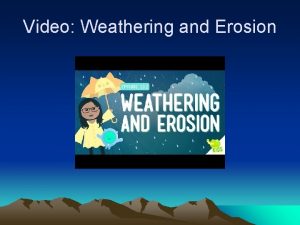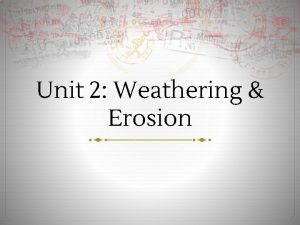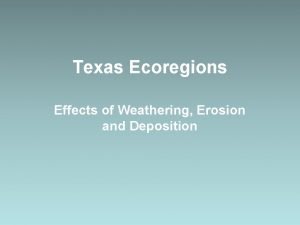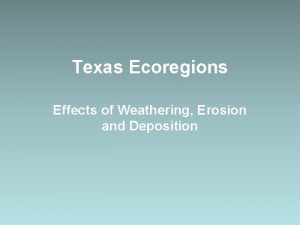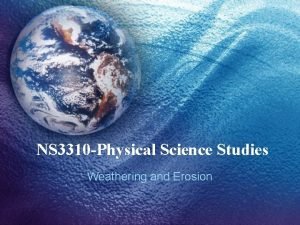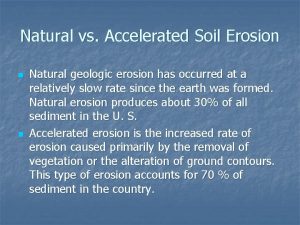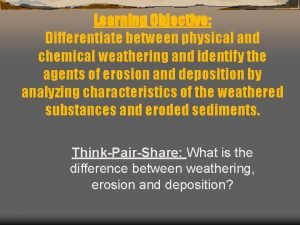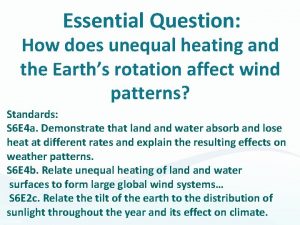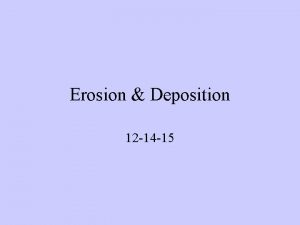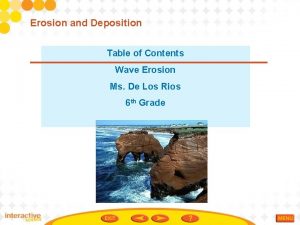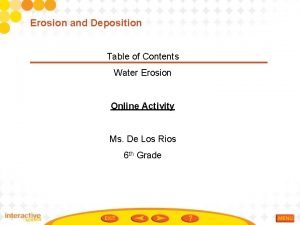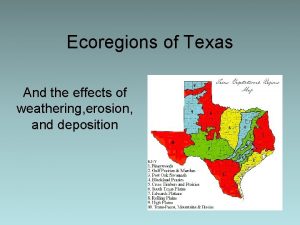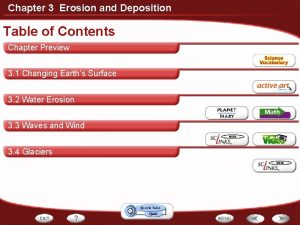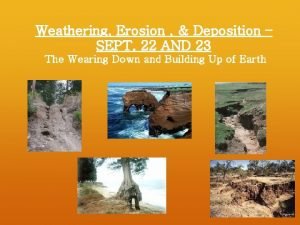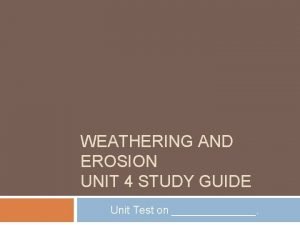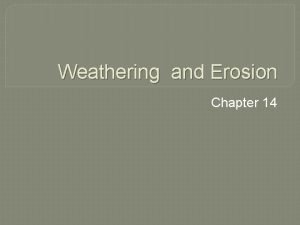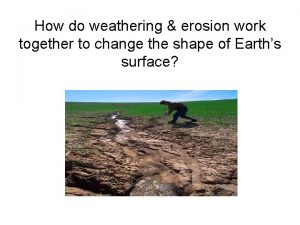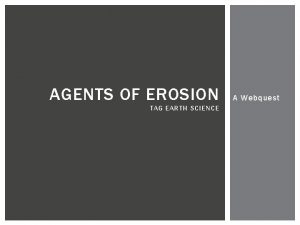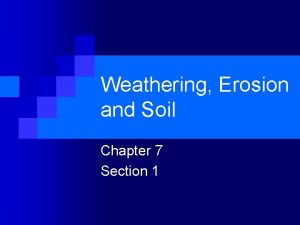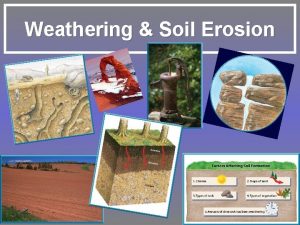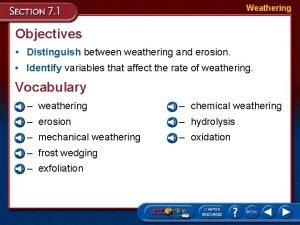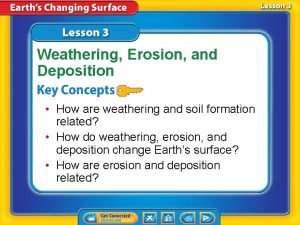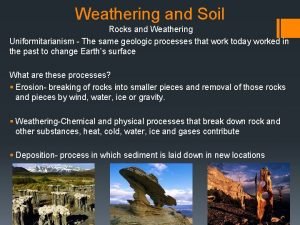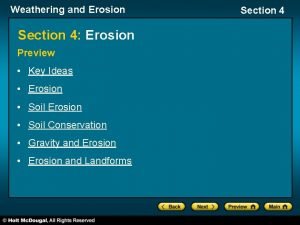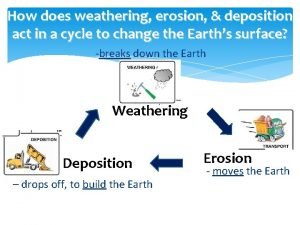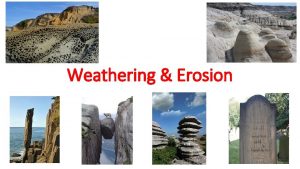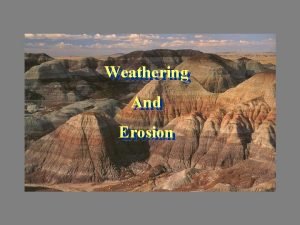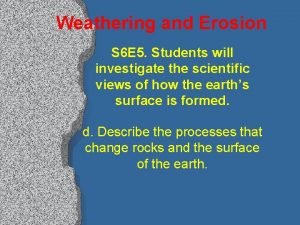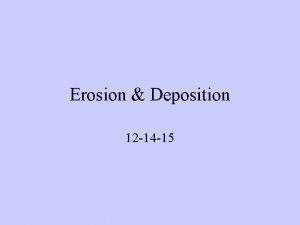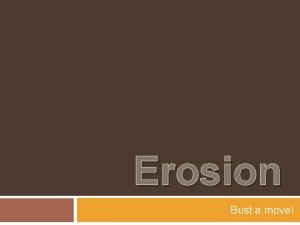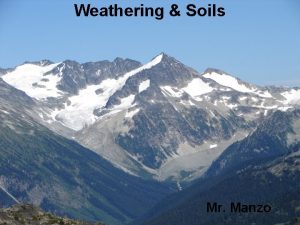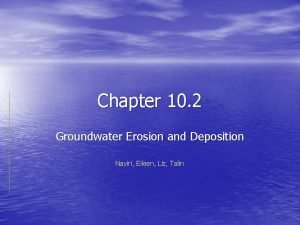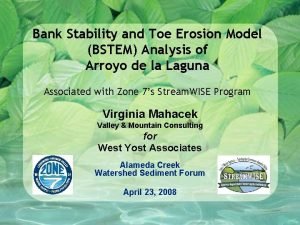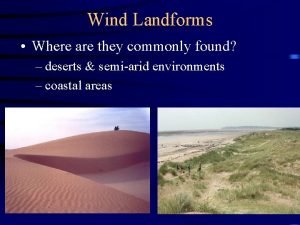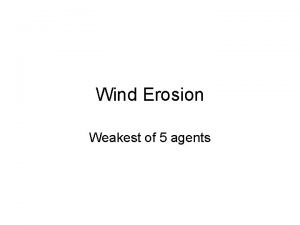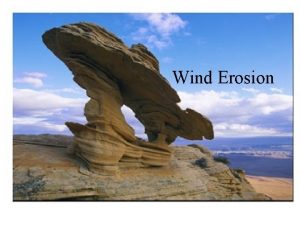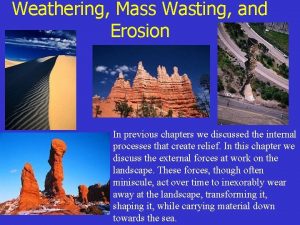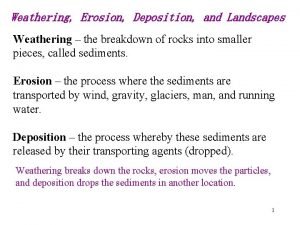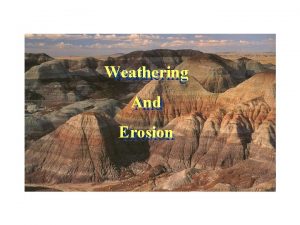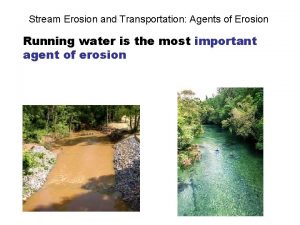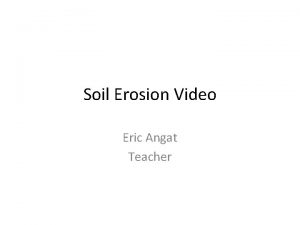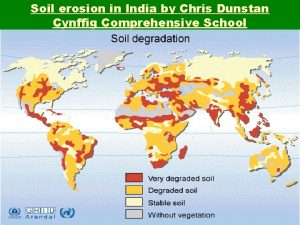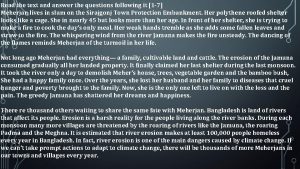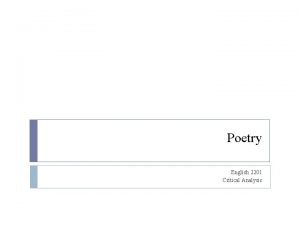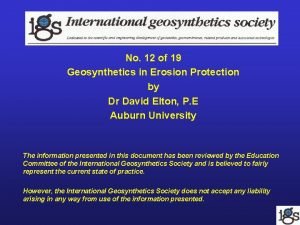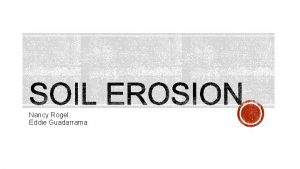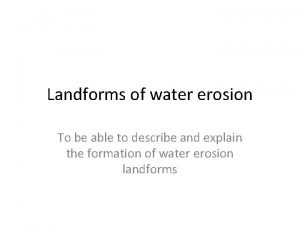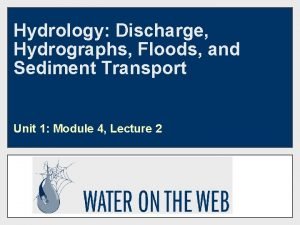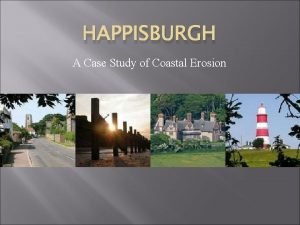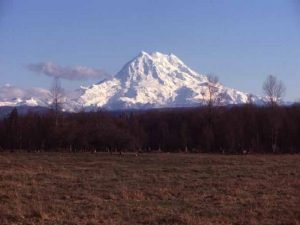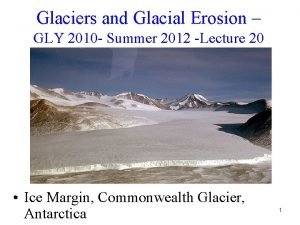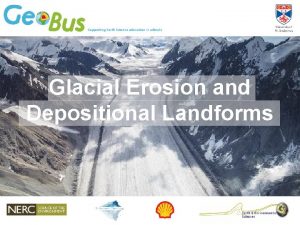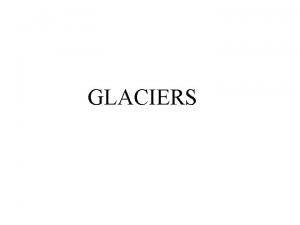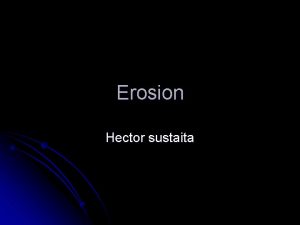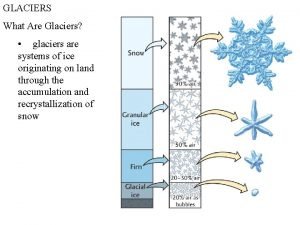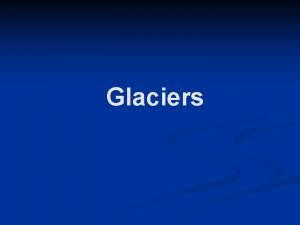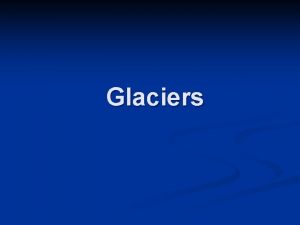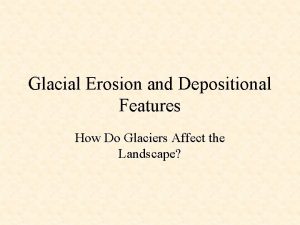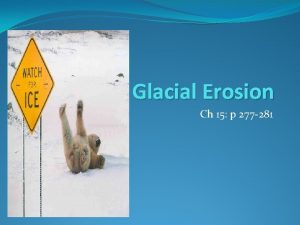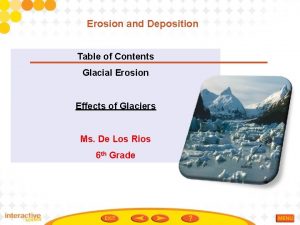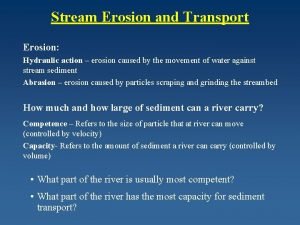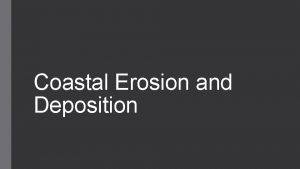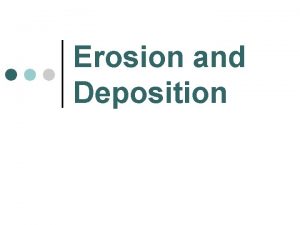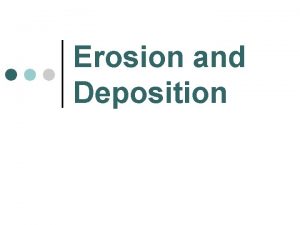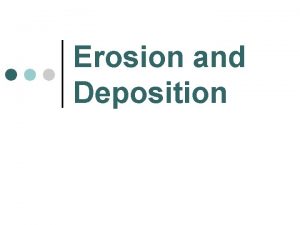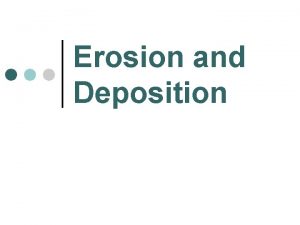Glaciers and Glacial Erosion GLY 2010 Summer 2013
































































































- Slides: 96

Glaciers and Glacial Erosion – GLY 2010 - Summer 2013 -Lecture 20 • Ice Margin, Commonwealth Glacier, Antarctica 1

Glacier • Moving mass of ice that forms when snowfall exceeds snowmelt over a long period of time • Movement is downhill, due to gravity • Form at or above the snowline, the lowest altitude at which snow commonly forms in the mountains • As climates warm, the snowlines are expected to move higher in elevation, and glaciers to retreat 2

Types of Glaciers 3

Continental Ice Sheet • Large ice masses that blanket a sizable part of a continent • Ice may be kilometers thick, and movement is limited, occurring mainly in local areas or very slowly over time 4

Present Day Continental Ice Sheets • Greenland Antarctica currently are occupied by continental ice sheets 5

Snowfield and Ice Cap • Large mass of snow and ice on a flat surface, topped by recent snow • Ice caps show little movement • They occupy the tops of mountains • Outlet glaciers may flow downward from the ice cap 6

Snowfield and Icecap Above Byrd Glacier, Antarctica • Snow blankets and fills the valleys between the nunataks in the foreground 7

Fox Glacier, New Zealand • Outlet glacier fed by Ice Cap 8

Mountain Valleys • High in the mountains, snow may accumulate • Glaciers are formed in stages § Snow § Firn § Glacial Ice 9

Snow • Snow occurs in many forms, for example wet or dry • Snow accumulates with a great deal of air trapped inside (you need to pack snow to make a decent snowball) 10

Firn • During the first summer following snowfall, some of the snow melts • Meltwaters trickles downward, helping to compact the snow • As winter approaches, resulting mass freezes together to form firn 11

Formation of Glacier Ice 12

Glacial Ice • Repeated years of thaw/freeze cycles, and the weight of accumulated firn and snow, transform the lower layers to ice • There are twelve known structural forms of water ice, at least half of which occur in nature 13

Cirque Glacier • Ice movement erodes a depression near the head of the glacier • Glacier occupies the hole for a prolonged period, creating a bowl-shaped depression under the glacier • After the cirque glacier melts, the depression remains • Cirque may be filled with water, and is called a tarn lake, or it may be dry 14

Cirque Glacier Photo 15

Cirque • Photo by Dr. Michael Hambrey 16

Alpine or Valley Glacier • Confined by surrounding bedrock highlands • Generally move down steep to very steep surfaces • As cirque glaciers expand, they flow into pre-existing stream cut channels, enlarging and changing the shape of these valleys • Stream valleys have V-shaped profiles, whereas glacial valleys are U-shaped 17

Valley Glacier Photo Valley glacier flowing through mountains in Alaska 18

Piedmont Glaciers • One or more valley glaciers flowing from the confines of valley walls and spread out to form broad sheets • Piedmont literally means foot of the mountain • Malaspina Galcier (Alaska) is a classic large piedmont glacier that descends to tidewater from several mountain sources 19

Tidewater Glacier, Alaska • Tidewater glaciers flow into the sea, calving icebergs 20

Calving Glacier Video • Video was shot from a small ship July 1993 about one-half mile from the calving glacier by the instructor © David Warburton, 2006 21

Glacial Zones • • Accumulation Wastage (Ablation) Fracture Flowage 22

Glacial Anatomy 23

Zone of Accumulation • Snowfall exceeds snowmelt, on average over many years • Upper portion of the glacier, at all depths 24

Zone of Wastage (Ablation) • Snowmelt exceeds snowfall, on average over many years • Glacier will retreat unless gravitational movement of glacier downhill replaces glacial ice as fast as it melts • 85% of world’s glaciers are currently retreating 25

Glacial Cross-Section 26

Zone of Fracture • Upper surface of glacier is under little pressure • Near toe of glacier, glacier moves faster, and pulls ahead of the ice uphill • Tensional cracks develop (crevasses) • Ice behaves as a brittle solid 27

Zone of Flowage • Lower part of the glacier, except near the toe, where glacier is thin 28

Glacial Advance and Retreat 29

Crevasses, Exit Glacier, Alaska • Extensional crevasses • Note that they have the same shape as normal fault blocks 30

Inside a Crevasse • Photos by Kristina Ahlnas, University of Alaska • Glacial ice is so blue because the dense ice of the glacier absorbs every other color of the spectrum except blue--so blue is what we see! 31

Meltwater • As glaciers melt, water trickles through the glacier, getting under it • May form under-ice stream channels • Channels form tunnels under the ice • Tunnels emerge at snout of glacier 32

Ice Cave • Video of tidewater glacier, Prince William Sound, Alaska, July, 1993 © David Warburton, 2006 33

Work of Glaciers • Like rivers, glaciers alter the landscape • They may erode the landscape, but they also deposit large amounts of material 34

Glacial Erosion • • Abrasion Quarrying U-shaped valleys Hanging valleys Cirque Arěte Horn Roche moutonnée 35

Abrasion • Rock fragments imbedded in the base of the glacier scrap, and polish underlying rock, and in some cases create long striations (thin) or grooves (thicker) in the bedrock • Stria and grooves indicate the direction of glacier movement 36

Kelley's Island Grooves, Ohio • Grooves may be of glacial or fluvial origin • View is in direction of ice flow 37

Glacial Striations • Striations are smaller than grooves 38

Quarrying • Large masses of bedrock are lifted away from the bed after water from the glacier seeps into cracks and refreezes (frost wedging) • Rock is incorporated into the glacier 39

New Zealand Glacier • Block to the right has been partially quarried 40

U-Shaped Valleys • Glacial ice follows previously cut stream valleys • Stream valleys have V-shaped profiles • Glacial erosion changes the shape to a U 41

Glacial Valley Development I • Typical, meandering V-shaped river valley 42

Glacial Valley Development II • Running water erodes and deepens the V - shape 43

Glacial Valley Development III • Glacier fills the river valley • Channel is widened and straightened 44

Glacial Valley Development IV • Melting of glacier reveals a U – shaped valley 45

Glacial Trough • The U-shaped glacial trough seen here is in Glacier National Park, Montana 46

Hanging Valleys • Where tributary glaciers flow into the trunk glacier, they are often unable to erode as fast as the heavier trunk glacier • When the ice melts, a hanging valley is left 47

Yosemite Valley • Click to see glacial features outlined 48

Waterfalls in a Hanging Valley • Yosemite Falls occupies a glacial valley 49

Cirque • Bowl-shaped depression near the head of an alpine glacier • Cirques remain long after glaciers disappear • May fill with water to become tarn lakes 50

Tarn Lake • Lake Ann, North Cascades National Park, is a tarn lake, occupying a cirque 51

Arěte • Knife-edged ridge of land, formed by parallel erosion of two alpine glaciers • Another visible sign of previous glaciation 52

Horn • A three or four-sided mountain • Cut by glaciers flowing off an isolated mountain in several directions • Matterhorn in Switzerland is an excellent 53 example

Roche Moutonnée • From the French, meaning sheep rock • Glacial abrasion smoothes the slope facing the oncoming ice • Glacial quarrying plucks rocks from the opposite slope, steepening it 54

Liberty Cap, Yosemite National Park • Liberty Cap is a Roche moutonnée 55

Alpine Glacial Erosion 56

Glacial Deposition • • Till Drift Erratics Rock flour 57

Glacial Till • Deposits directly from glacial ice, with no sorting • Light rocks are cobbles and pebbles • Dark tan "matrix" is a mixture of sand, silt, and clay 58

Formation of a Till Deposit 59

Glacial Drift • Includes glacial till, material dumped by glacier when melting • Deposits from meltwater flowing out under a glacier • Meltwater deposits are moderately to well-sorted 60

Rock Flour • Finally ground sediment produced under a glacier • Meltwater streams carry the flour to lakes like this one in Alberta, Canada 61

Moraines • Masses of glacial drift left behind by a glacier • Types of Moraine § Terminal § Lateral § Medial 62

Terminal Moraine • Left at the end of a glaciers advance • May act as a natural earth-fill dam • Multiple terminal moraines may form a series of hills, running parallel to a ridge of mountains 63

Moraine Formation 64

Terminal Moraine Formation • Terminal moraine is a more common name for what they call end moraine 65

Cape Cod From Space • Cape Cod is a terminal moraine • It marks the farthest point that the glaciers reached during the most recent "ice age" in North America 66

Southern New England Moraines 67

Lateral Moraine Photo • Lateral moraines are visible to either side of the glacier Athabaska Glacier, Jasper National Park, Canada 68

Medial Moraine Formation 69

Medial Moraine Photo • Wrangell National Park, Alaska • Lateral moraines merging to form a complex of medial moraines 70

Glacier Junction, Southern Alps, New Zealand 71

Twentymile Glacier, Alaska • Two tributaries meet in a complex of medial moraines 72

Outwash, Tasman Glacier, New Zealand • Running water re-works the glacial gravel into the outwash • Note the car in the lower center of the image 73

Braided Outwash Channels, Toklat River, Alaska • Braided channels are constantly changing 74

Glacial Erratics • Large glacial erratic • Ice is capable of carrying all sizes of material 75

Kettle Lakes • Form when a large chunk of glacial ice is buried as glacier passes over • Later, it melts, and forms a lake • Bear and Nymph Lakes, Rocky Mountain NP 76

Drumlin Aerial View of drumlin field • Gently rounded hills formed by a massive ice sheet (thicker then a glacier) overriding a moraine • Massive ice reshapes the moraine into elongated hills 77

Drumlin Formation 78

Esker Formation • Meltwater streams, flowing within or under active glaciers deposit sand gravel in curving channels • When the glaciers melt the eskers are exposed as topographically positive features • Long, linear features, sometimes in a network 79

Esker Photo • Esker visible as a sinuous ridge (arrow) in this aerial photo 80

Kame • Formed when meltwater washes sediment into openings in a stagnant wasting glacier terminus 81

Glacial Features 82

Glacial Subsidence and Rebound • Continental ice sheets are so heavy they depress the rock under them (subsidence, due to isostasy) • When the ice sheets melt, the land begins to slowly rise • In the Canadian Shield region, the glacial rebound rate is about one foot per century • Rebound is sometimes visible along lake-shores, where older beaches and wave-cut terraces are now considerably higher then the current lakeshore 83

Glacial Isostasy 84

Crustal Depression • Crust bulges on either side of glacier (isostasy) 85

Bulging Produces Raised Beaches 86

Postglacial Effects 87

Creation of Lake Missoula 88

Ice Dam Breaks 89

Bretz Floods • The resulting floods, which recurred numerous times, are called Bretz floods after J Harlan Bretz, who first realized the significance of the gravel ridges meters high, and sometimes with wavelengths of a hundred meters, as Ripple Marks! 90

Giant Ripple Marks • Aerial view of giant ripple marks 91

Catastrophic Flood • Flooding occurred about 13, 000 to 15, 000 years ago 92

Dry Falls • Dry channels occur hundreds of feet above the present river channels, and former cataracts existed in many areas • The best known of these, Dry Falls, is a 3. 5 mile wide former cataract that dropped 400' over vertical cliffs of basalt 93

Scablands • Floods gouged and tore at the land removing surface cover • Left masses of basaltic lava as remnants, like scabs on a wound • Area is now called the channeled scablands 94

Palouse Falls, Washington • Note the very large channel behind the falls 95

Pluvial Lakes • During glacial times, the climate was cooler, and evaporation rates were much lower in arid and semi-arid regions • Many pluvial lakes formed from rainwater which did not evaporate • Pluvial comes from Latin pluvia meaning rain 96
 Glaciers cause erosion by abrasion and
Glaciers cause erosion by abrasion and![Complexes of the type [m(aa)3]±n show Complexes of the type [m(aa)3]±n show](data:image/svg+xml,%3Csvg%20xmlns=%22http://www.w3.org/2000/svg%22%20viewBox=%220%200%20200%20200%22%3E%3C/svg%3E) Complexes of the type [m(aa)3]±n show
Complexes of the type [m(aa)3]±n show Gly
Gly Gly
Gly Control measures of soil erosion
Control measures of soil erosion Chapter 7 glaciers deserts and wind
Chapter 7 glaciers deserts and wind Chapter 8 mass movements wind and glaciers
Chapter 8 mass movements wind and glaciers Landslides moving water wind and glaciers cause
Landslides moving water wind and glaciers cause Chapter 5 glaciers oceans and landscapes
Chapter 5 glaciers oceans and landscapes Buffalo ridge minnesota
Buffalo ridge minnesota Alpine glacier vs continental glacier
Alpine glacier vs continental glacier What are the two main types of glaciers
What are the two main types of glaciers Is a valley
Is a valley Nsidc glaciers
Nsidc glaciers Bolivia glaciers
Bolivia glaciers Glacier terms
Glacier terms Summer school 2013
Summer school 2013 Erosion
Erosion Glacial ice is formed by
Glacial ice is formed by Vertiente del glacial artico
Vertiente del glacial artico คือ
คือ Glacial till
Glacial till Fossils as evidence of continental drift
Fossils as evidence of continental drift Michigan glacial history
Michigan glacial history Klasifikasi tanah astm
Klasifikasi tanah astm Glacial river warren
Glacial river warren Erosion
Erosion Similar fossils found on different continents
Similar fossils found on different continents Glacial deposits
Glacial deposits Glacial deposits
Glacial deposits Piedmont
Piedmont Nadw aabw glacial
Nadw aabw glacial Beringia map
Beringia map Erosion in piney woods
Erosion in piney woods Erosion
Erosion Waves dropping sand on the beach is an example of what
Waves dropping sand on the beach is an example of what Weathering and erosion video bill nye
Weathering and erosion video bill nye Walther penck
Walther penck Plant action weathering definition
Plant action weathering definition Weathering and erosion difference youtube video
Weathering and erosion difference youtube video Questions on weathering and erosion
Questions on weathering and erosion Weathering in piney woods
Weathering in piney woods Deposition
Deposition Get5gets.com
Get5gets.com Differentiate between geological and accelerated erosion
Differentiate between geological and accelerated erosion Differentiate between chemical and physical weathering.
Differentiate between chemical and physical weathering. Unequal heating and cooling erosion
Unequal heating and cooling erosion หุบเขา
หุบเขา How do waves cause erosion and deposition
How do waves cause erosion and deposition The term geologists use for underground water is
The term geologists use for underground water is Coastal sand plains weathering erosion and deposition
Coastal sand plains weathering erosion and deposition Weathering erosion and deposition
Weathering erosion and deposition Weathering and erosion
Weathering and erosion Weathering erosion
Weathering erosion Chapter 14 weathering and erosion review answers
Chapter 14 weathering and erosion review answers What happens when weathering and erosion work together?
What happens when weathering and erosion work together? Weathering webquest
Weathering webquest Chapter 7 weathering erosion and soil
Chapter 7 weathering erosion and soil Soils in ____ contain little organic material and are thin.
Soils in ____ contain little organic material and are thin. Distinguish between weathering and erosion
Distinguish between weathering and erosion Weathering and soil erosion
Weathering and soil erosion How does temperature break down rocks
How does temperature break down rocks Types of soil erosion
Types of soil erosion Erosion and deposition
Erosion and deposition Dilation and erosion examples
Dilation and erosion examples Weathering and erosion
Weathering and erosion Difference between erosion and deposition
Difference between erosion and deposition What is weathering and erosion
What is weathering and erosion What is deposition? *
What is deposition? * Diagram of erosion and deposition
Diagram of erosion and deposition Weathering vs erosion
Weathering vs erosion Erosion and weathering
Erosion and weathering Groundwater erosion and deposition
Groundwater erosion and deposition Bank stability and toe erosion model
Bank stability and toe erosion model Ertmer and newby 2013
Ertmer and newby 2013 Coso framework
Coso framework Miss maidie
Miss maidie Abrasion wind erosion
Abrasion wind erosion 5 agents of erosion
5 agents of erosion Abrasion wind erosion
Abrasion wind erosion Sheet water erosion
Sheet water erosion Cut bank geography
Cut bank geography Pictures of different agents of soil erosion
Pictures of different agents of soil erosion Weathering vs erosion
Weathering vs erosion Sedimentary weathering
Sedimentary weathering Erosion betydning
Erosion betydning Attrition erosion
Attrition erosion Eart
Eart Soil erosion video
Soil erosion video Soil erosion in india
Soil erosion in india Meherjan passage
Meherjan passage Sound device in english
Sound device in english Hard armor erosion control
Hard armor erosion control What is erosion
What is erosion Butte diagram
Butte diagram Sediment
Sediment Happisburgh erosion case study
Happisburgh erosion case study
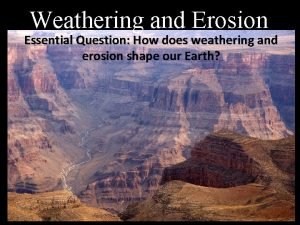
![Complexes of the type [m(aa)3]±n show Complexes of the type [m(aa)3]±n show](https://slidetodoc.com/wp-content/uploads/2020/12/3015715_d8412bc28f0c7b6a8c2ea3744ce60d97-300x225.jpg)

